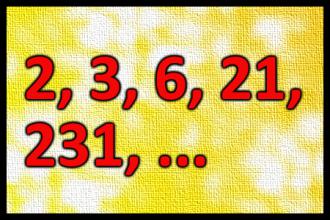What number comes next?
Look at the series (2, 3, 6, 21, 231), determine the pattern, and find the value of the next number!Correct answers: 56
The first user who solved this task is Slobodan Strelac.
#brainteasers #math

A priest was preparing a man f...
A priest was preparing a man for his long journey into the night.
Whispering firmly, the priest said, "Denounce the devil! Let him know how little you think of his evil."
The dying man said nothing.
The priest repeated his order. Still the dying man said nothing.
The priest asked, "Why do you refuse to denounce the devil and his evil?"
The dying man said, "Until I know where I'm heading, I don't think I ought to aggravate anybody."
Whispering firmly, the priest said, "Denounce the devil! Let him know how little you think of his evil."
The dying man said nothing.
The priest repeated his order. Still the dying man said nothing.
The priest asked, "Why do you refuse to denounce the devil and his evil?"
The dying man said, "Until I know where I'm heading, I don't think I ought to aggravate anybody."

